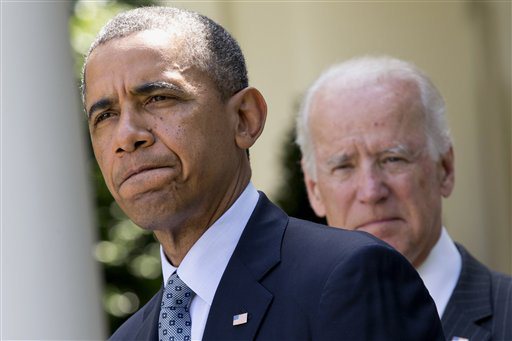Earlier today, President Barack Obama and Vice President Joe Biden announced a new campaign designed to change the culture on college campuses and prevent sexual assault before it happens. But without increasing penalties for rapists, can this campaign do any real good?
Don’t get me wrong. I love that politicians and celebrities are speaking out against sexual violence. It’s great that they’re asking young men to take responsibility for stopping sexual assault. But the #ItsOnUs campaign is no stick and all carrot. It’s like trying to stop armed robbery by reminding people that stealing is wrong.
The reality is that one in five women will be sexually assaulted while they’re in college. That translated to 3,900 reports of forcible sex offenses in 2012. And it’s not like universities are doing everything in their power to bring this number down. In fact, 55 U.S. colleges are currently under federal investigation for possible civil rights violations related to how they’ve handled sexual violence and harassment complaints.
Even in clear-cut cases, penalties rarely amount to more than a slap on the wrist. The Center for Public Integrity estimates that only 10 to 15% of students found “responsible” for sexual assault are permanently expelled. Even then, judges have proven more than willing to help these criminals regain their diplomas.
This issue of enforcement took center stage earlier this month when Columbia University senior Emma Sulkowicz began carrying her mattress around campus to protest how the school handled her sexual assault. She says the mattress, where she was raped on her first day of her sophomore year, represents the weight of what happened to her and the fear she carries around each day. She has committed to bringing the mattress with her everywhere she goes until her rapist is expelled.
In response to her brave public stance, Ms. Sulkowicz has been called a liar, an attention whore, and much, much worse. Many are concerned that her accusations could ruin a young man’s life before it has even begun. But what if she had been stabbed or shot? Would people be worried about her attacker’s job prospects then?
The disturbing core of the problem is that our society sees sexual violence as less terrible than other forms of violence. It believes the female body was ultimately made for the pleasure of men. That’s why the White House thinks the #ItsOnUs campaign is enough. It believes that changing this perception is the first step toward solving the problem.
That’s all well and good, assuming it’s just a first step. But the Justice Department Office on Violence Against Women seems to think this is the entire journey. It was proud to announce that it will award roughly $6 million to 18 colleges with grants to develop comprehensive campus sexual assault prevention and response programs. But what about the other 37 colleges currently under federal investigation? Not to mention the other 7,000-plus post-secondary institutions in the United States? Don’t they need some help, too?
Days before the launch of the #ItsOnUs campaign, Secretary of State John Kerry tried to appeal to women to support the United State’s latest military campaign in Syria and Iraq. In response to protests by the feminist anti-war organization Code Pink, Secretary Kerry said, “You ought to care about fighting ISIL because ISIL is killing and raping and mutilating women—and they believe women shouldn’t have an education.”
If the White House truly wants to stop violence against women—and protect their right to a safe education—how about we start by investing in fighting rapists here at home.
Tegan Jones is a freelance writer and editor based in New Orleans, Louisiana. She specializes in gender, environmental and economic issues. You can find her on Twitter.
Related Links:

